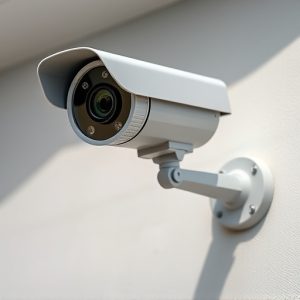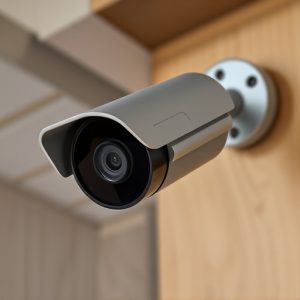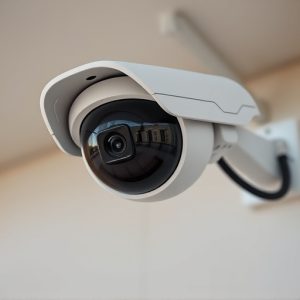Dummy Cameras: Spotting Fakes, Comparing Battery Life, Legal Implications
Dummy cameras, while popular as cheap security alternatives, suffer from limited battery life and la…….
Dummy cameras, while popular as cheap security alternatives, suffer from limited battery life and lack advanced functionalities compared to real security cameras. This text compares dummy camera battery life, emphasizing the advantage of wired real security cameras with longer operational durations. It warns against purchasing counterfeit devices due to legal risks, potential privacy violations, and safety concerns. Consumers are urged to compare battery life through user reviews and specs to avoid low-quality fakes.
In today’s digital era, home security is a top priority. However, consumers are increasingly encountering a deceptive trend: fake security monitoring device setups. This article delves into the intricacies of understanding these counterfeit systems, specifically focusing on dummy cameras and their varying features. We compare battery life between real and fake cameras to help you spot potential scams. Additionally, we explore legal implications and safety concerns associated with purchasing counterfeit security gear. By armed with this knowledge, you can make informed decisions for your home protection.
- Understanding Fake Security Monitoring Devices
- Types of Dummy Cameras and Their Features
- Battery Life Comparison: Real vs Fake Cameras
- Uncovering the Truth: How to Spot Fake Security Devices
- Legal Implications and Safety Concerns with Counterfeit Security Gear
Understanding Fake Security Monitoring Devices
In recent years, a new trend has emerged in the realm of home security: fake security monitoring devices. These are often in the form of dummy cameras designed to mimic real security systems, offering a seemingly simple and cost-effective solution for homeowners concerned about safety. However, understanding their limitations is crucial. Unlike genuine security cameras with advanced features like motion detection and real-time alerts, dummy cameras typically lack these capabilities, providing only a visual deterrent.
When it comes to battery life comparison, one key differentiator between fake and genuine security devices is power consumption. Genuine security cameras are designed for continuous operation and often come equipped with long-lasting batteries or rechargeable options that can last for months, ensuring constant monitoring. In contrast, dummy cameras usually have shorter battery lifespans, requiring more frequent replacements, which raises questions about their reliability as a long-term solution for home security.
Types of Dummy Cameras and Their Features
Dummy cameras, also known as fake or mock security cameras, come in various types, each with unique features catering to different needs and preferences. One of the primary considerations when choosing a dummy camera is its battery life—a crucial aspect for ensuring continuous surveillance without frequent replacements.
In terms of battery life comparison, wireless dummy cameras often rely on rechargeable lithium-ion batteries, offering a range from 6 to 24 hours on a single charge. These cameras are convenient and eco-friendly, with some models featuring motion detection and night vision capabilities. In contrast, hardwired dummy cameras are typically powered directly from an AC outlet, eliminating battery concerns but requiring more extensive initial setup. This category includes basic mock security cameras ideal for indoor use, providing clear images but without advanced features like motion sensors or long-lasting batteries.
Battery Life Comparison: Real vs Fake Cameras
When comparing dummy cameras, also known as fake security monitoring devices, one crucial aspect to consider is battery life. Unlike traditional security cameras, these fake setups often run on batteries, which can be a double-edged sword. On one hand, they offer the convenience of wireless deployment and flexibility in placement. On the other, battery life becomes a critical factor for continuous monitoring.
In terms of dummy cameras battery life comparison, real security cameras with wired connections typically enjoy longer operational durations due to their direct power supply. In contrast, fake cameras rely on batteries that may last from several days to a week, varying based on model and usage intensity. This difference highlights the trade-off between ease of setup and continuous surveillance, a key consideration for homeowners and businesses alike when choosing a security solution.
Uncovering the Truth: How to Spot Fake Security Devices
Uncovering the Truth: How to Spot Fake Security Devices
In today’s digital era, securing your home or business is a top priority for many folks. This has led to an explosion in the number of security monitoring devices available on the market. However, not all these products are created equal. One common scam involves selling fake security cameras that mimic genuine models but lack essential features and reliability. To protect yourself from such deceptions, it’s crucial to compare key specifications, particularly battery life, when considering a purchase.
Dummy cameras often claim impressive battery lifespans on their packaging, but these claims can be misleading. Always look beyond the marketing hype and scrutinize the technical details. A genuine security camera with high-quality components and advanced features should offer a significantly longer operational duration compared to its low-cost counterparts. By comparing battery life directly through user reviews and manufacturer specifications, you can easily identify fake devices disguised as legitimate security solutions.
Legal Implications and Safety Concerns with Counterfeit Security Gear
The purchase and use of counterfeit security gear, such as dummy cameras, can have significant legal implications. Many countries have strict regulations governing surveillance equipment, including requirements for data protection, privacy, and consent. Using non-functional or inferior devices designed to mimic legitimate security monitoring equipment can violate these laws, leading to potential fines and other penalties. Moreover, the sale and distribution of counterfeit gear can contribute to a lack of trust in genuine security products, undermining public safety efforts.
Safety concerns are another critical aspect to consider when dealing with fake security monitoring devices. Dummy cameras, for instance, may appear realistic but often lack essential features like motion detection, night vision, or data storage capabilities. This can lead to false alarms or, worse, a false sense of security for homeowners and businesses. Battery life comparison between genuine and counterfeit products is also essential; cheap imitations may have shorter battery lifespans, requiring more frequent replacements and potentially leaving users vulnerable during power outages or other emergencies.
When purchasing security monitoring devices, it’s crucial to be vigilant against counterfeits like dummy cameras. Understanding the various types and their features, along with battery life comparison between real and fake cameras, can help you make informed decisions. By knowing how to spot fake security devices, you not only protect yourself from potential legal implications but also ensure your safety and peace of mind. Always remember that genuine security gear is an investment in your protection, so stay alert and choose wisely.


